Latin: Inspiring Future Teachers
L.I.F.T Grant recipients have sent photos or descriptions of their activities where they brought teachers and prospective teachers together to talk about a career path including teaching Latin. Greek, Ancient History, etc.
Please send your own stories and photos to the webmaster. Consider applying for a mini-grant to cover your costs!
Hunter College 2016.
On June 3 from 6:00-8:00 p.m., I hosted a gathering of our Hunter Latin MA program graduates, incoming graduate students, current students, faculty, and some other interested individuals for a reunion and party. One of the keys to continuing to promote Latin at the secondary level, in my opinion, is offering support to our graduates who are now teaching – most, but not all, in the Greater New York City area – and helping to bring our current and new students into that great network of alums. At last count I believe 28 attended our event, with several others sending their regrets because of other commitments. We met in the 8th floor faculty dining room at Hunter College (68th St. and Lexington Ave. in Manhattan). By 9:00 pm, I had to kick everyone out because our event time was up, but some continued their conversations elsewhere till later in the evening.
We had representation from an alum from the early 1990s through a brand-new incoming graduate student, and of course many who are out there teaching Latin now (and a bit of Greek) at the secondary level. One came down from New Hampshire for the event. Bill Mayer, who played a major role in the program until poor health forced his too-early retirement, was remembered by many for his influence. Prof. David Petrain, who is starting his term as graduate adviser of the program, had a chance to see the strength of our alums, who are now in leadership positions in various classics organizations and who teach at a wide variety of schools. Some now also teach as adjuncts in the program from which they graduated.
I am very proud of our MA graduates and find them to be a wonderfully energetic, smart, stimulating, and generous group of professionals with whom to work. Our event gave old friends a chance to reconnect, but also gave alums from different eras a chance to meet and to network. Amid food and drink we took time – I think about 45 minutes! – to each introduce ourselves to the whole group and to talk a bit about our careers. (See the picture of us at the long table.) I know we all really enjoyed this part of our event and I recommend it to others planning such a reunion. The richness of experience of our grads is something from which we can all learn.
I would like to thank NLTRW for my third mini-grant. We hosted supported events in 2005 and 2008. I guess in 2016 we were long overdue for another! I encouraged the gathering to apply for their own mini-grants. $200 is just enough to make an event possible, when it might not be otherwise. It is also a great incentive to make sure we periodically take time for an event dedicated to strengthening and increasing the teaching of Latin at the secondary level.
--Ronnie Ancona, Hunter College and CUNY Graduate Center
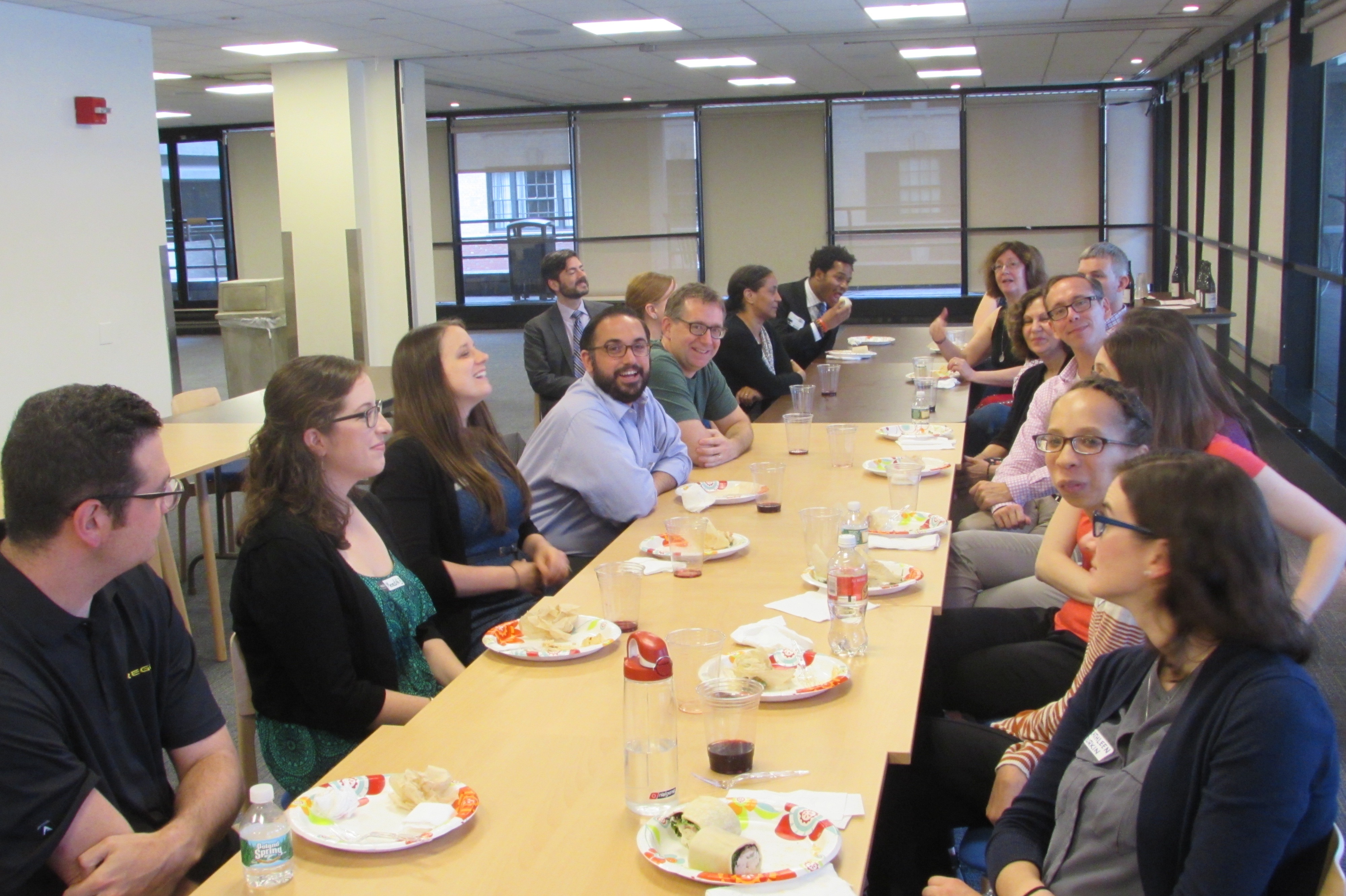
Jackson State University 2016.
African-American Read-In focuses on first professional post-slavery classicist.
Concordia College 2015.
On March 11, the four members of the Concordia Classical Studies department (Barbara McCauley, Edward Schmoll, Heather Waddell Gruber and C. McKenzie Lewis) hosted a dinner at a local Greek restaurant in honor of National Latin Teacher Recruitment Week. Our guests were two Concordia students (Kaia Nygord, Noah Dovre), both of whom are declared Latin Education majors. A third student, who intends to get a K-8 endorsement in Latin on her teaching certificate (Madison Luke), was unable to attend. All five Latin teachers from our local high schools were invited and encouraged to bring with them any of their students who were interested in Latin or Classical Studies majors in college. The concept behind this annual event is to thank students currently majoring in Latin Education, to encourage those who are considering it as a career, and to give these students the opportunity to talk to actual Latin teachers about Latin as a teaching career.
Three of the five local Latin teachers attended the dinner. As usual, the event helped us keep in touch with the local K-12 teachers and introduce them to the Latin Education students who would be student teaching in their classrooms. Our two Latin Education majors very much enjoyed touching bases with the pros in their field. A good time was had by all.
Barbara McCauley
Professor & Chair
Concordia College 2014.
On March 27, the four members of the Concordia Classical Studies department (Barbara McCauley, Edward Schmoll, Heather Waddell Gruber and C. McKenzie Lewis) hosted a dinner at a local Greek restaurant in honor of National Latin Teacher Recruitment Week. Our guests were three Concordia students, all of whom are declared Latin Education majors. All five Latin teachers from our local high schools were invited to attend and encouraged to bring with them any of their students who were interested in Latin or Classical Studies majors in college. The concept behind the dinner is to thank students currently majoring in Latin Education, encourage those who are considering it as a career and to give these students the opportunity to talk to actual Latin teachers about Latin as a teaching career.
Although teacher attendance was less than in the past, this was due to some unfortunate last minute schedule conflicts that arose and was not a reflection on the popularity of the event. One of the attending teachers remarked that the dinner was something that he looked forward to every year, an event that energized him for the rest of the school year. Two of the Latin Education majors who had attended last year's dinner agreed that it confirmed their interest in the field and the newly declared major felt that he had made a good choice.
In addition to the dinner, during the week of March 24-28 members of Eta Sigma Phi visited some of our beginning Latin classes and talked about their interest in the Classics and in Latin, in particular.
University of Alberta 2014.
Thank you again for the mini-grant in support of our annual Classics Reception. I'm pleased to report that our reception was a great success, thanks in no small part to your grant.
Following on the success of last year's Reception, we again hosted a coffee-and-cake reception featuring recitations of Greek and Latin by faculty and students. Too often students think of Latin and Greek as puzzles to be decoded rather than as real languages that were spoken by real people who had real, and interesting, things to say. Offering recitations, and encouraging the students to recite as well, has been one of our most successful attempts at outreach. In addition to the cake and coffee enjoyed by everyone, the students were offered Latin buttons, magnets, and brochures about Latin and Latin teaching, while our recitors were given door prizes of Latin coffee mugs (the "nunc est bibendum" one was the most popular). Everyone enjoyed the afternoon, the cake, and the camaraderie.
We are also in the midst of a recruitment drive to encourage students to take Classics, Latin, or Greek as a major and to consider doing Honors as well, was used not only to enhance camarderie and community and to spread the word of the viability of Teaching Latin as a career path but also to allow us to connect with potential majors, minors, and Honors students.
Approximately 50 students and faculty, including the Dean of the Faculty of Arts, were in attendance. Receptions like this really help to raise the visibility of Classics in our large Faculty (even more so since we are members of a joint History & Classics Department) and to foster a sense of community among our students and faculty, and could not be held without your mini-grant. Thanks again for your help as we work to enhance Classics at the U of Alberta, and in particular to reach out to potential Latin teachers.
Kelly MacFarlane (U Alberta)
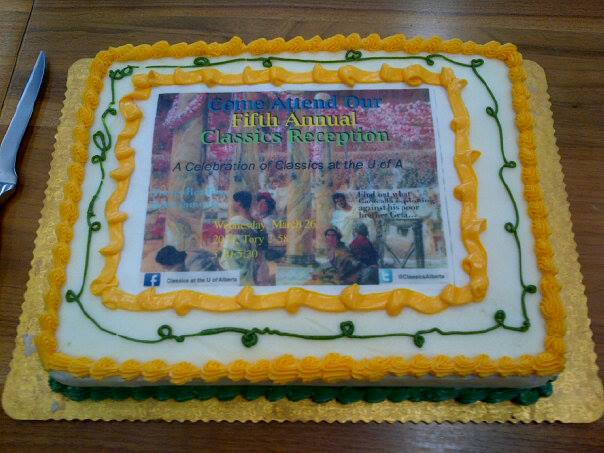
Concordia College 2013.
On March 12th, three members of the Concordia Classical Studies department (Barbara McCauley, Edward Schmoll, and Heather Waddell Gruber) hosted a dinner at a local Greek restaurant in honor of National Latin Teacher Recruitment Week. Our guests were two Concordia students, one who is currently a Latin Education major and another who is considering the major. We also invited the four Latin teachers from our local high schools to attend (David Volk and Kathy Strand of Fargo North High School, Kendra Hansen of Fargo South and Brian Geffre of Shanley High School) and encouraged them to bring with them any of their students who were interested in Latin or Classical Studies majors in college.
The concept behind the dinner was to thank students currently majoring in Latin Education, encourage those who are considering it as a career and to give these students the opportunity to talk to actual Latin teachers about Latin as a teaching career. The dinner was extremely successful in all respects. The student who had not yet committed to a Latin Education major said that she was now ready to declare the major.
University of Alberta 2013.
2013 marked the Department of History and Classics's 5th year observing NLTRW. This year's event was a Neronian Festival, featuring recitations in Latin, Greek, and English. Despite the weather (we were hit with a freak, even for us, snowstorm that dumped an extra 8-10 inches of snow on our fair city), we had an excellent turnout of faculty and students and our Dean of Arts.
Prof. Christopher S. Mackay, sporting his toga, recited the Latin text of Horace 3.3 and Martial 10.47, and gave us a spirited defence of the value and utility of a Classical education. Prof Selina Stewart recited (in Greek) Sappho frag. 1, while Katy Mackay, one of our Contract Academics / Adjuncts, treated us to the Greek of the proem of the Iliad. One of our upper-year students, John Manderscheid, then gave us a recitation of an English poem on a Classical theme. All were well-received by the audience, for whom we hoped to make Latin (and Greek) a living language rather than just weird words on a page. Following the formal program, faculty and students mingled over refreshments, cursed the weather, and discussed all things Classics. As always, the need for more Latin teachers in grade schools and high schools was highlighted, during the opening remarks and subsequent conversations and through the distribution of the promotional pamphlets from the National Committee for Latin and Greek.
Thank you for your grant in aid of our yearly, and always enjoyable, Classics Reception. Here's to an even more successful NLTRW2014!
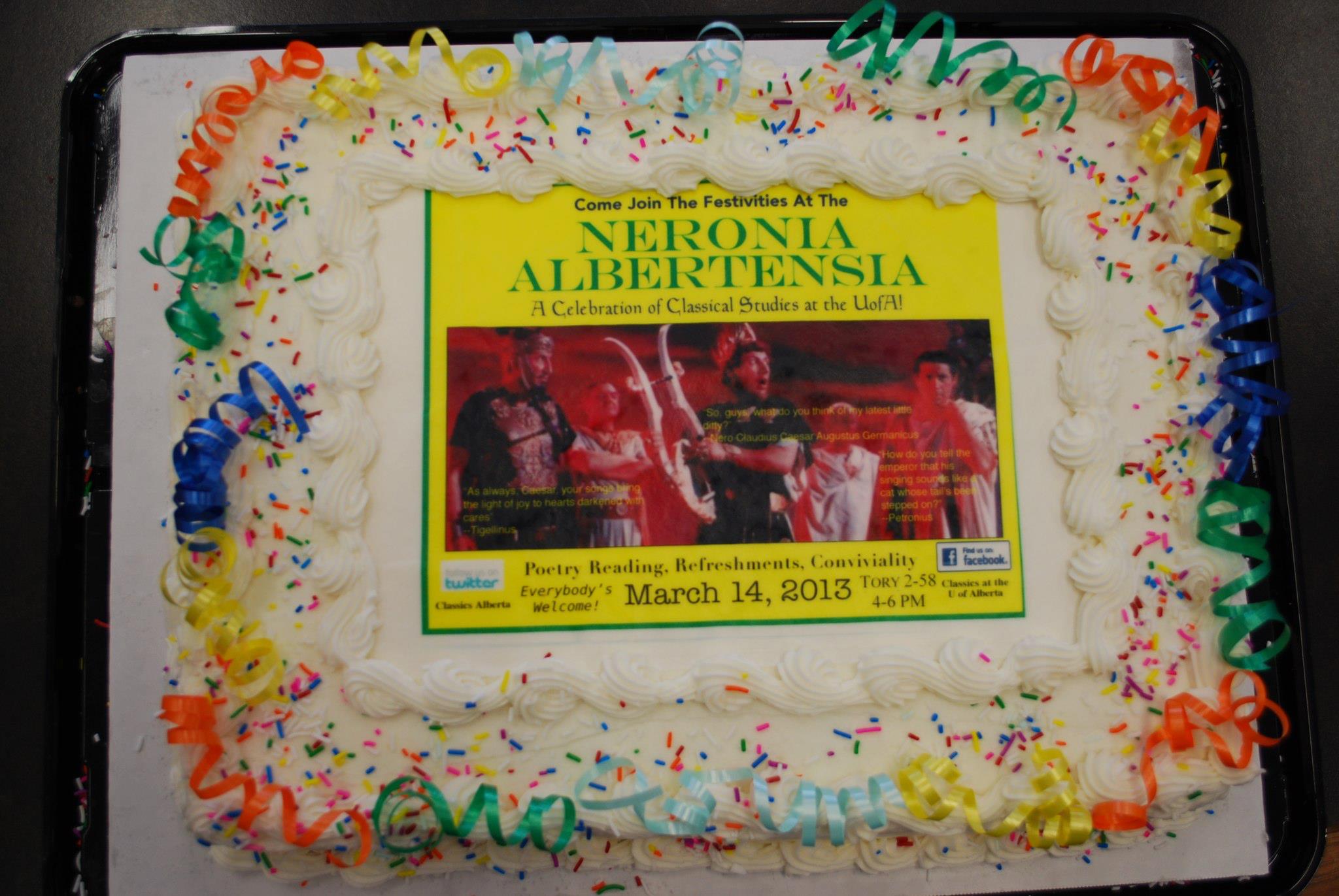

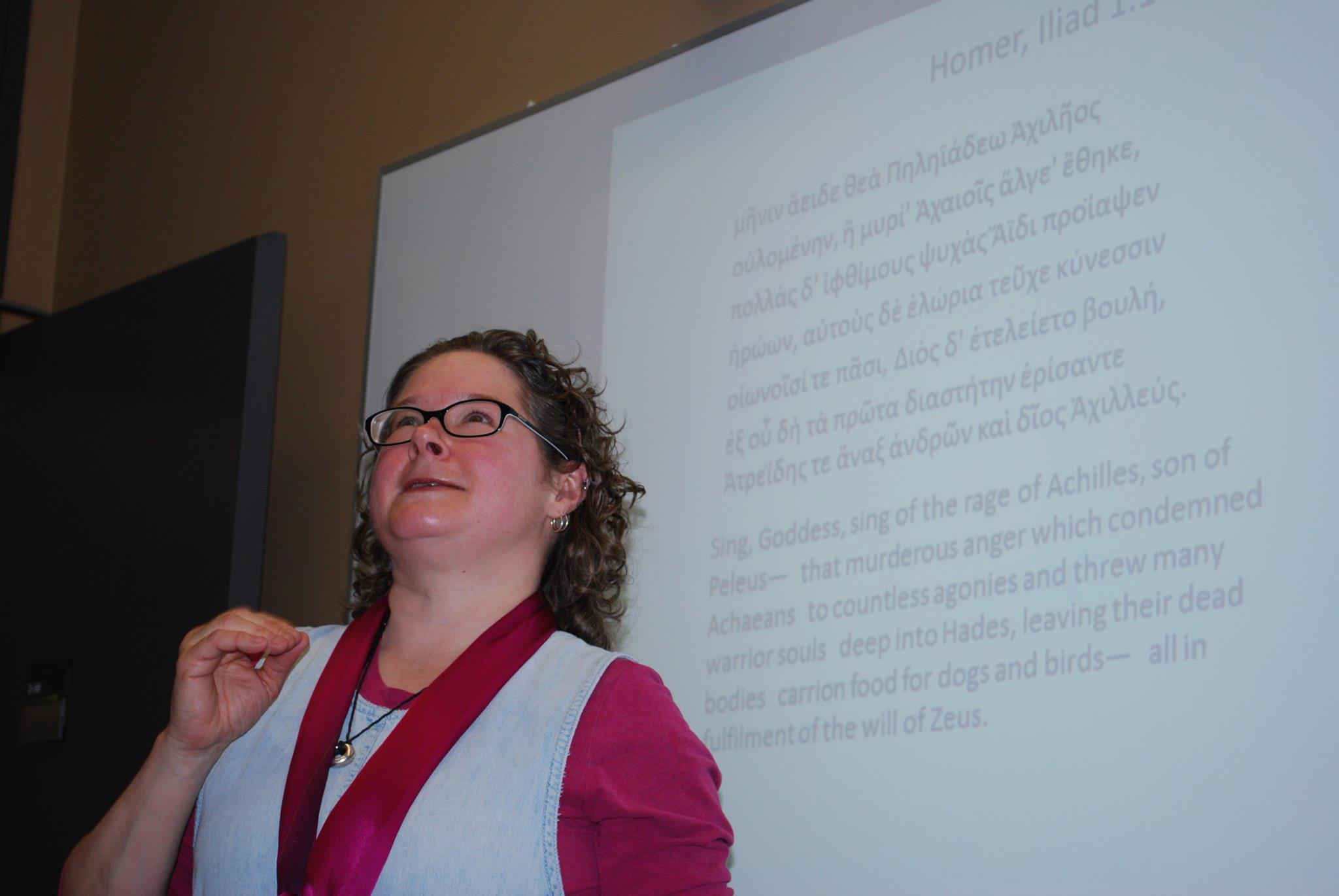
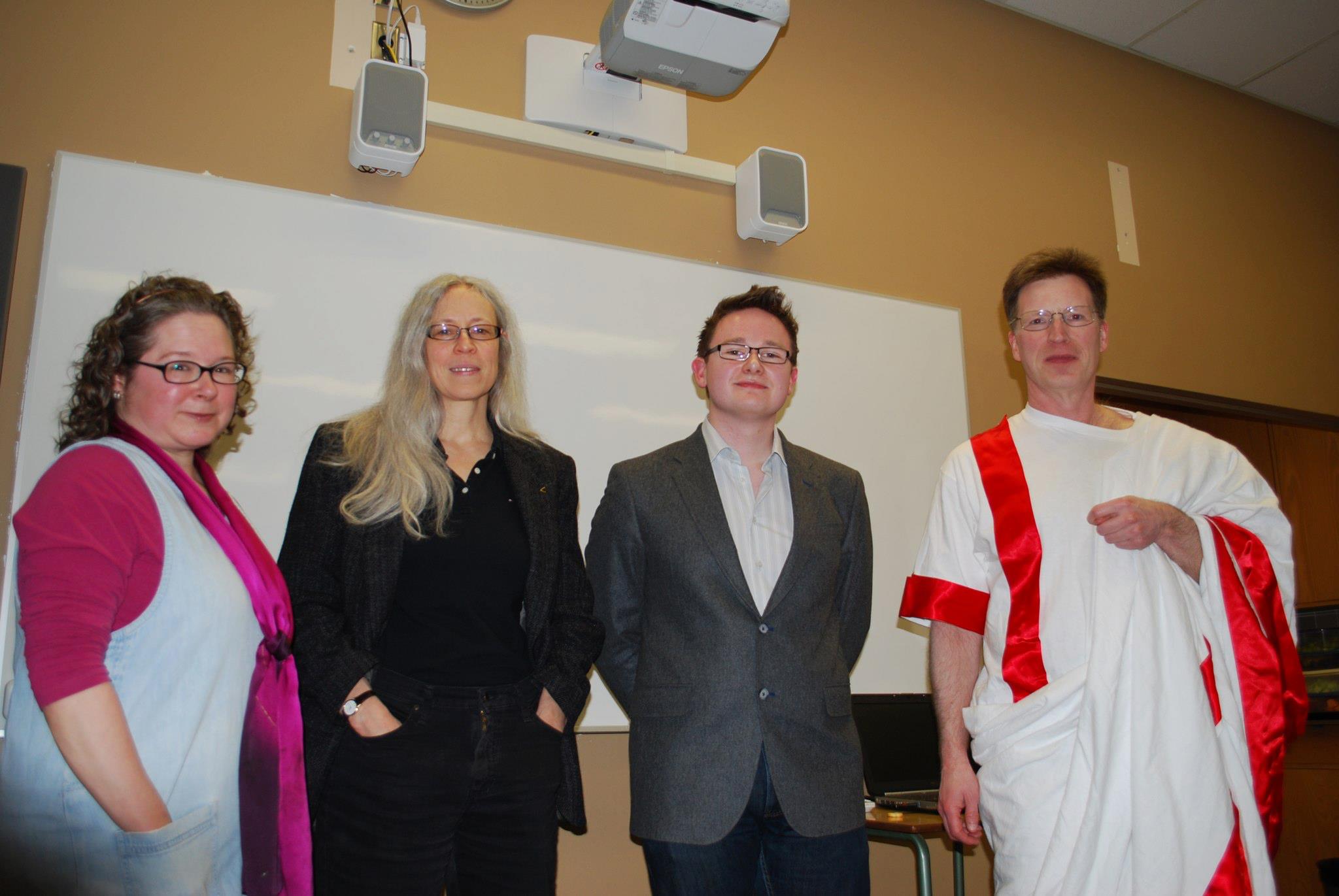
University of Toronto in 2012.
In March the Department of Classics at the University of Toronto organized an event that featured members of the undergraduate Oral Reading Club performing readings of ancient texts in Greek and Latin. The event was orgnized by undergraduates Maya Chakravorty and Greg Darwin, and also included performances by Anna Beausoleil, Vicky Peters, Toby Keymer, and Willem Crispin-Frei. The students read pieces from Vergil's Aeneid, Suetonius' Caligula, Tacitus' Agricola, the Iliad, Aeschylus' Agamemnon, and, last but certainly not least, a Latin translation of Lewis Carroll's nonsense poem Jabberwocky (Gabberbocchus).
There was a large turnout, with some students bringing their families, and the students are hoping that the performances will infect others with a love for reading aloud Greek and Latin texts. Those in attendance will certainly agree with Maya that "reading all of these texts out loud really does bring a whole new dimension of meaning and beauty to what are already fabulous pieces of literature." The event was partly funded by the National Latin Teacher Recruitment Week, with Toronto high school teachers Margaret Rogow and Michael Bales, respectively, introducing the students and talking about the rewards of teaching Latin and Greek. --Alison Keith.
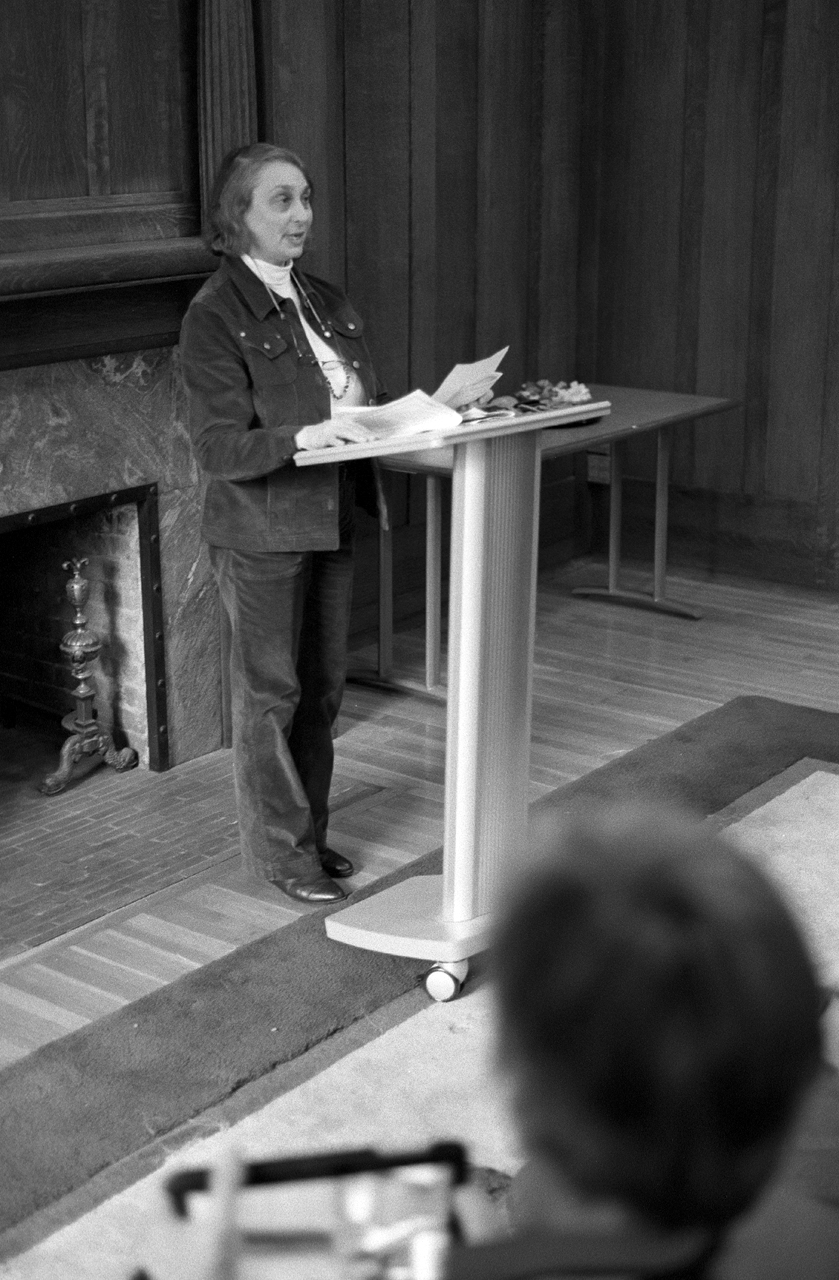
Maggie Rogow of North Toronto Collegiate Institute, Opening Remarks on oral reading
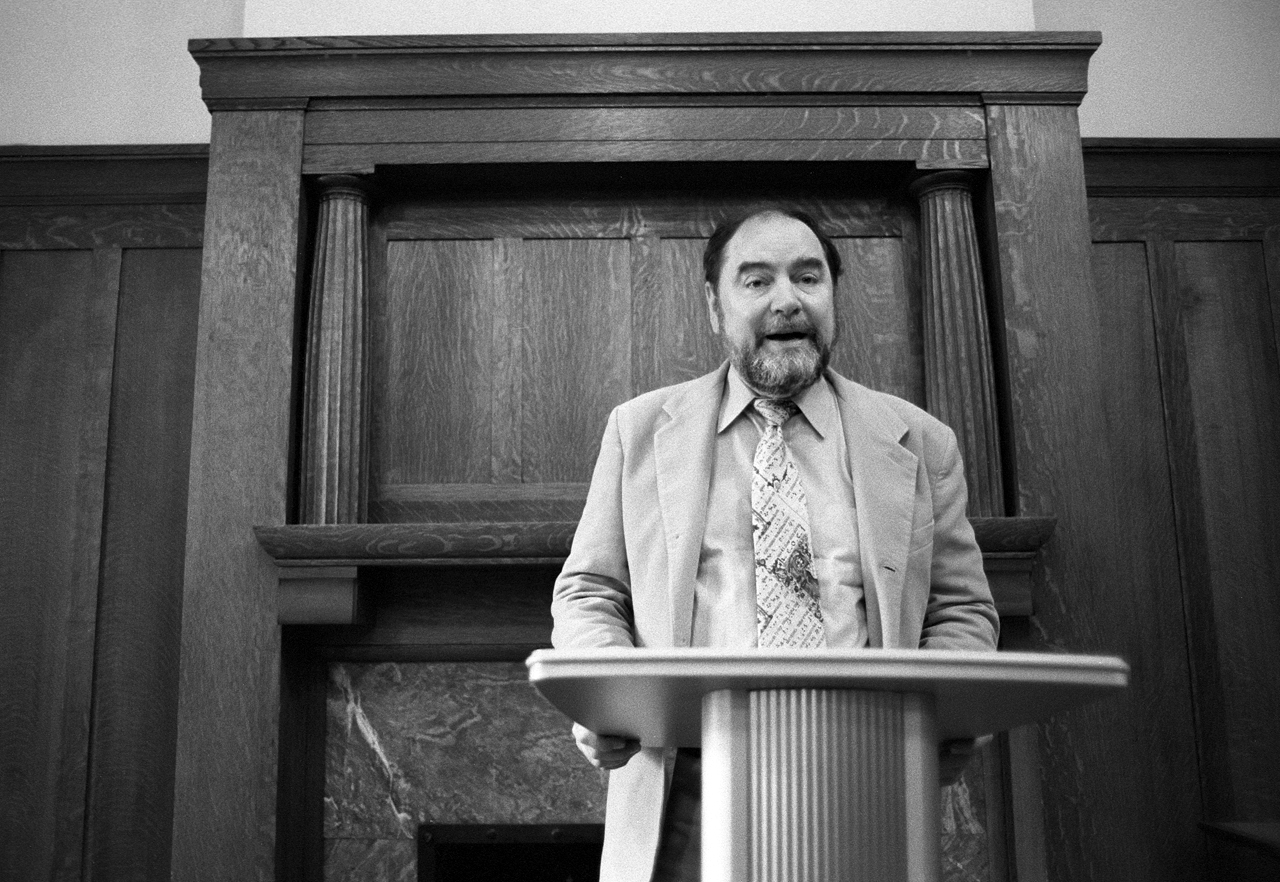
Michael Bales of Toronto French School, Closing Remarks on teaching Latin in secondary schools
Please follow this link for more lovely photos and video of the event.
University of Alberta in 2012.
We held our reception on March 20, since our theme this year was "Vale Hiems!" We had an excellent turnout of students, including our upper-year Classics majors, who have come to love all things Classics, as well as non-majors and our first year students, many of whom we hope to recruit as majors. As students and faculty mingled over cookies, we discussed the value --and sheer fun -- of Classics courses and the shortage of Latin teachers and the employment opportunities that this could present for students with Latin degrees.
In keeping with our theme, the student who came dressed as Pluto (looking for his wife, attempting to entice her back with pomegranate seeds) received one of our door-prizes. The other prizes went to the two students who have started up a Classics club. We'll work with the students' Classics club to help foster interest in Classics in general, and of Latin teaching in particular.
Alas, our attempt to see winter off was less than successful and we were hit with 25cm / 10 inches of fresh snow on April 5. Nonetheless, our reception was a great success with the students, who are looking forward to taking more Classics courses and some of whom are giving serious consideration to teaching Latin as a viable career path. The students are also looking forward to next year's celebration of Classics in general and teaching Latin in particular. Thank you again -- we could not host our reception without your support. --Kelly MacFarlane
University of Alberta in 2011.
I am pleased to report that our Classics Reception in conjunction with NLTRW was a great success! We had a far greater turn-out this year than in previous years, thanks in part to upper year students, who have become very fond of our annual event, encouraging new students to attend, and to our increased use of Facebook (UAlberta Classics). Faculty and students (graduate, undergrad, majors, minors, and the as-yet-undecided) mingled for a few hours over cookies and snacks, talking about Classics in general, our never-ending winter, and the potential career path of teaching Latin. The brochures and pamphlets from the National Committee were widely available, as were our own departmental Classics buttons.
A great time was had by all, thanks to the generous mini-grant from the Committee which enabled us to provide the refreshments. We recruited a few new majors, as well as having the opportunity to mingle with our students (there are far too few opportunities these days for faculty and students to meet outside of class). The students are looking forward to next year's event (we already have our theme: Vale, Hiems!). These receptions are an excellent opportunity to promote Classics in general, and Latin (and Latin teaching) in particular and I don't think we'd be able to host them without the help of the Committee and the mini-grant. --Kelly MacFarlane
New ideas!!
* One thing we tried this year was to invite undergraduates who are thinking about teaching as a career to attend the summer conference of the American Classical League. There they were able to meet with Latin teachers, including alumni of our program. --Eric Dugdale
* I have a permanent display of articles and job ideas for Classics majors in my room. I talk about this on and off throughout the year, pointing out ways to combine interests in computers, science, history, linguistics, mythology, Latin and Greek, travel, etc., into a Classics-based career such as teaching, archaeology, teaching at the university level, and so forth. --Steve Perkins
University of Alberta in 2010.
This year, I decided to do something slightly different -- rather than advertise it as a NLTRW party, I advertised it as an Ides of March Party and we had an excellent turn-out of students (both graduate and undergraduate) and faculty (surpassing the turnout of the last two years). We encouraged costumes and the 4 students with the best costumes went home with NLTRW t-shirts or coffee mugs. The NLTRW pamphlets were distributed and we explained the need for Latin teachers, especially at the public school level. The Classics party worked very well not only as a recruitment tool (one student is planning to teach Latin, several students have declared an intention to major in Classics, and another student has decided to do Honours in Classics) but also as a way to foster community spirit among our students. Students got to meet other students with similar interests, and students and faculty got to interact outside of course concerns. All in all, it was a great success. --Kelly MacFarlane
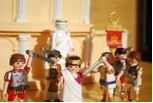
Playmobile tableaux recreating the assassinatin of Julius Caesar.
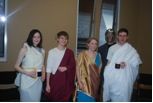
The prize winners.
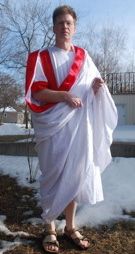
Chris' Playmobile tableaux recreating the assassinatin of Julius Caesar.
Hunter College's NLTRW in 2008.
Here are the invitation and a photo of our very successful event. The turnout was great (about 40 or so as I recall), including some people from far away and long ago, plus it was a rare time for even those of us currently in the program to socialize. I very much appreciate the support from the 2008 NLTRW Mini-Grant and the CAAS Resource Grant. --Ronnie Ancona
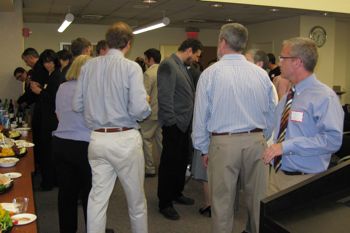
Hunter College's NLTRW in 2005.
About twenty-five people, including college students from Hunter and beyond, secondary school teachers, and Hunter faculty gathered for our first National Latin Teacher Recruitment Week event. We advertised through e-mails to Hunter Classics majors, announcements in our classes, e-mails to area college professors and secondary school teachers, and postings to LatinTeach, the Classics List, and the New York area Classics website. As Director of Hunter's MA in the Teaching of Latin program, I gave some basic information on teaching Latin at the secondary school level (and how it is like and not like teaching at the college level) and two current secondary school Latin teachers, Timothy Flannery, who received his MA from Hunter and has been teaching for several years and Jonathan Yee, a current student in our MA program and a new teacher this year, shared their perspectives on Latin teaching. We handed out information about New York State Latin certification and Hunter's MA, which includes NY State certification. All participants received promotional pencils with Latin inscribed, e.g., SPQR, Carpe Diem, Ad Astra Per Aspera. The mini-grant allowed us to buy the pencils, do xeroxing of materials, and serve refreshments. The session was scheduled for one hour, but some people were still talking informally long after that hour was up! --Ronnie Ancona
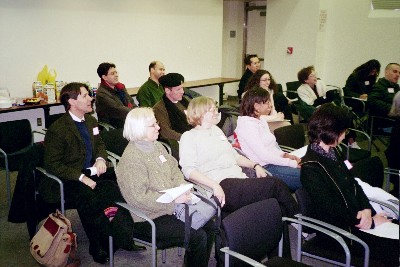
Partial view of the audience, including current Hunter MA student and future Latin teacher, Marie-Therese Mudd
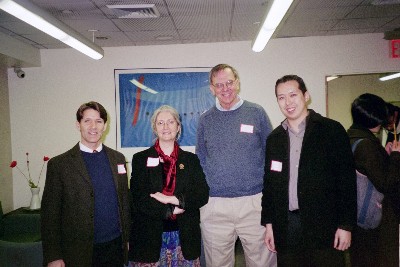
Pictured from left to right, Timothy Flannery, Latin teacher at Packer Collegiate Institute, Ronnie Ancona and William Mayer, faculty in Hunter's MA program, Jonathan Yee, Latin teacher, The Masters School
